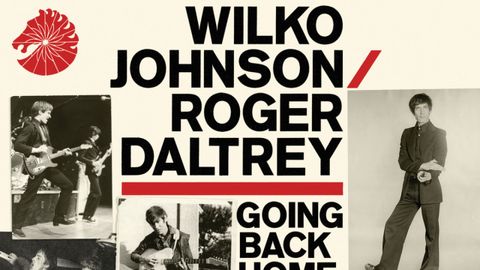The first words Roger Daltrey sings on this album, on its opening and title track, are ‘I wanna live the way I like’, reminding not only what a superb (and increasingly so) singer he is, but also what a great interpreter of other people’s songwriting he is.
Having spent years translating the neurotic rage and brandified existential doubt of Pete Townshend, Daltrey is expert in finding the emotion and power in someone else’s words. Now, being the second great singer to vocalise Wilko Johnson’s lyrics (you know who the first one is), he brings years of experience and sympathy to his role. Because, surely, if there’s anyone who wants to live the way he likes, it’s Wilko, a man whose reaction to the news of his (fortunately still delayed) imminent demise was to live his life utterly in the present.
In a year that most of us would have spent… I don’t know, quietly at home, Wilko has toured, given interviews, taken drugs, toured, toured and now recorded an amazing album. Amazing because Wilko should have had a singer as good as this years ago to complement his brilliant band. Amazing because there aren’t many people who’d gel with Wilko’s history, personality (his time with the Dr. Feelgood suggests he was never the meek kind of guitarist) and songwriting. And, finally, amazing because it’s a great record.
Released on Chess Records (and for once that’s not vanity label-making), Going Back Home is unsurprising only on one level: the selection of songs is almost entirely predictable, being several of the best and best-known Wilko Johnson songs. There’s the title track, there’s Sneaking Suspicion, All Through The City, Everybody’s Carrying A Gun and I Keep It Myself (wisely, there’s no Roxette, She Does It Right or Back in The Night, songs strongly associated with Dr. Feelgood singer Lee Brilleaux). There’s also a melancholy ballad, called Turned 21, and there’s a great version of a song not generally considered great: Bob Dylan’s Can You Please Crawl Out Your Window, which now feels like it’s been waiting for the Daltrey/Johnson treatment all of its life.
But then the glory of this record is that these songs, which have been recorded many times, often by Johnson himself in different settings, have never sounded like this. The production is sympathetic, the band sound amazing, and with Daltrey’s vocals (and, I presume, harmonica) they’re bigger and better. Decades of R&B inform this album, from Wilko’s love of the blues to Roger’s days with the High Numbers.
The girder linking the two men is, of course, the greatest British rock’n’roll band of all time, The Pirates. That band’s earliest days, with Johnny Kidd, gave The Who Shakin’ All Over. Their later guitarist, Mick Green, was both a collaborator with and an influence on Wilko Johnson. (Green’s sound, via Wilko, extended into the post-punk guitar of Gang Of Four and beyond, and his influence was arguably much more important and exciting than that of Clapton, Page or any of the other blues boomers.) You won’t hear new tricks too often here, Wilko does what he’s been doing all his career, playing extraordinary rhythm and lead in the way that really only he can do. His band play the songs as well as anyone can. There are no extended solos, funky revamps or changes of tempo. And Daltrey makes no attempt to change the meaning or content of the material, he just sings the backside off it. Not like a blustery blues singer, though, or a rock god, but like the most powerful rhythm and blues singer in the world.
As his recentish work with The Who has shown (check out Real Good Looking Boy and the Endless Wire album), Daltrey is possibly a better singer now than he was in the 60s, and he brings to these songs not the glorious fags’n’sleaze of Brilleaux or the matter-of-fact caw of Wilko himself, but the lion-with-several-million-thorns in its paw voice that only he can do. It’s not all rolling thunder, either.
Turned 21 is a gorgeous, pained song, a side of Wilko’s songwriting we could always do with more of. The Dylan cover contains all the sneer of young Bob in the disdain and experience of an older man. All Through The City is as urgent as any young R&B band, especially when Daltrey sputters out the chorus and Wilko lets loose a guitar break like hail on glass (and it’s sort of lovely that the words which end this album are ‘down by the jetty’).
By and large this is a record with more energy, excitement and passion than probably any other rock album you’ll hear this year.


